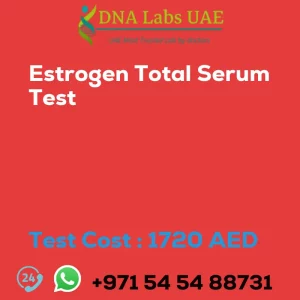C1 Esterase Inhibitor Functional Test
At DNA Labs UAE, we offer the C1 Esterase Inhibitor Functional Test to assess the functionality of the C1 esterase inhibitor (C1-INH) protein. This test is crucial in diagnosing deficiencies or dysfunctions of C1-INH and monitoring the effectiveness of treatment in individuals with hereditary angioedema (HAE) or other related conditions.
What is C1 Esterase Inhibitor?
The C1 esterase inhibitor (C1-INH) is a protein that plays a crucial role in regulating the complement system and the coagulation cascade in the body. It functions as a C1 inactivator, meaning it inhibits the activity of C1, the first component of the classical pathway of the complement system. The complement system is a part of the immune system that helps to eliminate pathogens and promote inflammation. However, when uncontrolled, it can lead to excessive inflammation and tissue damage.
Function and Importance of C1 Esterase Inhibitor
C1-INH prevents excessive inflammation and tissue damage by binding to and inhibiting C1, which is responsible for initiating the classical pathway of the complement system. Additionally, C1-INH also has inhibitory effects on other components of the coagulation cascade, such as factor XIIa and kallikrein. By regulating these processes, C1-INH helps to maintain the balance between coagulation and fibrinolysis, preventing excessive clotting.
Testing for C1 Esterase Inhibitor Functionality
To test the functionality of C1-INH, various laboratory assays can be performed. These include:
- Measuring the level of C1-INH in the blood
- Assessing its inhibitory activity against C1 or other target proteins
- Evaluating the ability of C1-INH to regulate complement activation or coagulation
These tests help in diagnosing deficiencies or dysfunctions of C1-INH and monitoring the effectiveness of treatment in individuals with HAE or other related conditions.
C1 Esterase Inhibitor Functional Test Details
Test Name: C1 Esterase Inhibitor Functional Test
Test Components: 2 mL (0.5 mL min.) serum from 1 Red Top (No Additive) tube. Do not use SST gel barrier tubes. Separate serum within 1 hour of collection and freeze. Ship frozen. Duly filled Test Send Out Consent Form is mandatory.
Price: 860.0 AED
Report Delivery: Sample by 7th of the month; Report after 2-3 weeks
Method: Enzyme Immunoassay
Test Type: Disorders of Complement system
Doctor: Physician
Test Department: OS
Pre Test Information: No special preparation required. Duly filled Test Send Out Consent Form is mandatory.
Conclusion
The C1 Esterase Inhibitor Functional Test is an essential diagnostic tool for identifying deficiencies or dysfunctions of C1-INH. By accurately assessing the functionality of this protein, healthcare professionals can effectively diagnose and treat individuals with HAE or related conditions. At DNA Labs UAE, we offer this test at a cost of 860.0 AED. Contact us today to schedule an appointment or for more information.
| Test Name | C1 ESTERASE INHIBITOR FUNCTIONAL C1 INACTIVATOR FUNCTIONAL Test |
|---|---|
| Components | |
| Price | 860.0 AED |
| Sample Condition | 2 mL (0.5 mL min.) serum from 1 Red Top (No Additive) tube. Do not use SST gel barrier tubes. Separate serum within 1 hour of collection and freeze. Ship frozen. DO NOT THAW. Duly filled Test Send Out Consent Formis mandatory. |
| Report Delivery | Sample by 7th of the month; Report after 2??3 weeks |
| Method | Enzyme Immunoassay |
| Test type | Disorders of Complement system |
| Doctor | Physician |
| Test Department: | OS |
| Pre Test Information | No special preparation required. Duly filled Test Send Out Consent Formis mandatory. |
| Test Details |
The C1 esterase inhibitor (C1-INH) is a protein that plays a crucial role in regulating the complement system and the coagulation cascade in the body. It functions as a C1 inactivator, meaning it inhibits the activity of C1, the first component of the classical pathway of the complement system. The complement system is a part of the immune system that helps to eliminate pathogens and promote inflammation. However, when uncontrolled, it can lead to excessive inflammation and tissue damage. C1-INH prevents this by binding to and inhibiting C1, which is responsible for initiating the classical pathway of the complement system. Additionally, C1-INH also has inhibitory effects on other components of the coagulation cascade, such as factor XIIa and kallikrein. By regulating these processes, C1-INH helps to maintain the balance between coagulation and fibrinolysis, preventing excessive clotting. Deficiency or dysfunction of C1-INH can lead to hereditary angioedema (HAE), a rare genetic disorder characterized by recurrent episodes of swelling in various body parts. This is due to uncontrolled activation of the complement system and excessive production of bradykinin, a peptide that increases vascular permeability. To test the functionality of C1-INH, various laboratory assays can be performed. These include measuring the level of C1-INH in the blood, assessing its inhibitory activity against C1 or other target proteins, and evaluating the ability of C1-INH to regulate complement activation or coagulation. These tests help in diagnosing deficiencies or dysfunctions of C1-INH and monitoring the effectiveness of treatment in individuals with HAE or other related conditions. |








